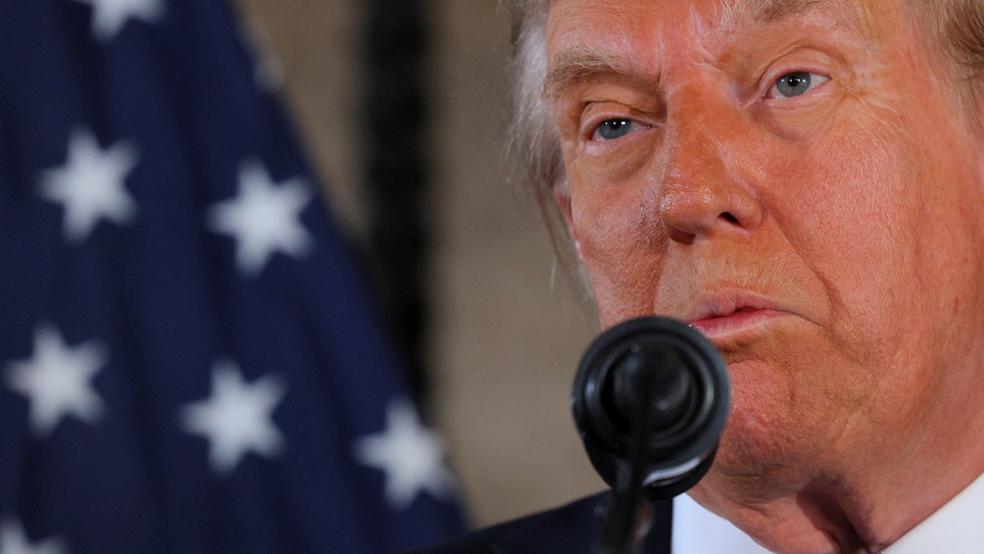In his first press conference since winning a second term in the White House last month, President-elect Donald Trump took a freewheeling tour through a wide range of topics, touching on subjects including the polio vaccine, work rules for federal employees, the cost of building a border wall with Mexico, tariff policy and a new pledge from a foreign corporate leader to invest in U.S. businesses.
Standing at his club in Florida alongside SoftBank CEO Masayoshi Son and commerce secretary nominee Howard Lutnick, Trump announced that Son has pledged to invest $100 billion in the U.S. over the next four years with a focus on artificial intelligence, creating at least 100,000 jobs in the process.
In 2016, Son pledged to invest $50 billion in the U.S. following Trump’s first win, and he said he wanted to do more the second time around. “My confidence level to the economy of the United States has tremendously increased with his victory,” Son said. “President Trump is a double-down president. I’m going to have to double down.”
As Bloomberg noted, it’s not clear if Son fulfilled his earlier pledge, with many of SoftBank’s eventual tech investments struggling, including a multi-billion dollar loss on the office space startup WeWork. But Son’s pledge was a clear sign nevertheless of how many global corporate leaders and investors are responding to Trump’s win.
Trump noted how different the days leading up to his new administration have been compared to his first administration. “Everybody was fighting me,” he said about his first term. “This term, everybody wants to be my friend. I don’t know – my personality changed or something.”
Here are some of the other topics Trump discussed:
Border wall: The president-elect vowed to resume building the border wall and reminisced about his efforts in his first term. “We spent a tremendous amount of money in building the wall,” he said. “It's very powerful steel. It's very hard steel, special type of steel, but very, very hard to cut inside the steel.”
Trump also complained that the Biden administration was selling off materials that had been purchased to build more segments of the wall, as required under the most recent National Defense Authorization Act. Saying he had spoken to the Texas attorney general and the state’s U.S. senators, Trump declared that “we are going to, you know, have a restraining order” on the Biden administration to halt further sales. “I’m asking Joe Biden to stop his people from giving it away,” he added. “It’s something that people can’t even believe is happening.”
Trump said the materials would cost more to purchase at current market prices, raising the cost of the wall.
Tariffs: Trump affirmed his faith in the use of tariffs as a primary tool in international trade. “They tax us, we tax them,” he said. “Tariffs will make our country rich.”
Lutnick indicated that tariff policy will depend on how Trump feels the country is being treated by trade partners. “Reciprocity is something that is going to be a key topic for us,” he said. “How you treat us is how you should expect to be treated.”
Vaccines: Although Robert F. Kennedy Jr., Trump’s pick to lead the Department of Health and Human Services, has expressed hostility toward vaccines, the president-elect said he wouldn’t allow one of the most successful vaccines in history to be halted in his new administration. “You’re not going to lose the polio vaccine. That’s not going to happen,” he said.
On the other hand, he did show some sympathy for the critics of vaccines and suggested that he might support ending vaccine mandates in schools. “I don’t like mandates,” he said. “I’m not a big mandate person.”
Federal employees: Trump said he was in favor of firing federal workers who fail to return to work full time, echoing plans to end telework discussed by Elon Musk and Vivek Ramaswamy, the leaders of an as-yet-undefined “Department of Government Efficiency” tasked with cutting costs. “If people don't come back to work, come back into the office, they're going to be dismissed,” he said.
Trump referred to a recent agreement reached by Social Security Administration Commissioner Martin O'Malley and the American Federation of Government Employees that extended telework rights and protections until 2029. “It's ridiculous,” Trump said. “They just signed this thing. So, it was like a gift to a union, and we are going to obviously be in court to stop it.”
Following the press conference, the president of the federal employee union issued a statement pushing back against Trump’s characterization of remote work and declared that the union would defend the agreement. “Collective bargaining agreements entered into by the federal government are binding and enforceable under the law,” AFGE National President Everett Kelley wrote. “We trust the incoming administration will abide by their obligations to honor lawful union contracts. If they fail to do so, we will be prepared to enforce our rights."
Budget
Trump Talks Tariffs, Border Wall, Vaccines and Much, Much More

Reuters



